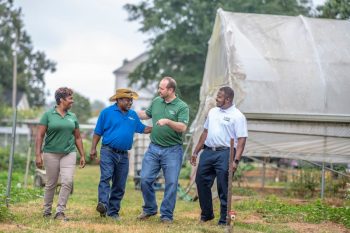The Miscellaneous Title of the Farm Bill is divided into four sections: livestock; socially disadvantaged and limited-resource producers; other miscellaneous; and a fourth section on oilheat efficiency, research, and jobs training.
Title XII established programs under the National Animal Health Laboratory Network (NAHLN) in its livestock subtitle, including the National Animal Disease Preparedness Response Program (NADPRP) and the National Animal Vaccine and Veterinary Countermeasures Bank (NAVVCB). The livestock subtitle also creates regional cattle and carcass grading centers, authorizes appropriations for Sheep Production and Marketing Grant Program, and calls for a report to be written on the USDA Food Safety and Inspection Service’s provision of guidance and outreach to small meat processors.
The agriculture and food defense title moves the USDA Office of Homeland Security under the Department of Agriculture Reorganization Act of 1994.
 The historically underserved producers subtitle expands its programming by establishing the Tribal Advisory Committee and including other tribal provisions (US Senate Committee on Indian Affairs), creating an Office of Urban Agriculture and Innovative Production, and increasing mandatory funding for the Farming Opportunities Training and Outreach (FOTO) program.
The historically underserved producers subtitle expands its programming by establishing the Tribal Advisory Committee and including other tribal provisions (US Senate Committee on Indian Affairs), creating an Office of Urban Agriculture and Innovative Production, and increasing mandatory funding for the Farming Opportunities Training and Outreach (FOTO) program.
The Tribal Advisory Committee “establishes a permanent tribal advisory committee within USDA to provide technical assistance, guidance, and direction on all polices implemented by the USDA and its Office of Tribal Relations” (US Senate Committee on Indian Affairs) and considers the unique needs of American Indian Country.
The Office of Urban Agriculture and Innovative Production will coordinate research, partnerships and outreach to “promote urban, indoor, and other emerging agricultural practices” (USDA ERS) and oversee municipal-level food-waste reduction agreements and programs.
Finally, the Farming Opportunities Training and Outreach (FOTO) program combines and makes permanent the Outreach and Assistance for Socially Disadvantaged and Veteran Farmers and Ranchers Program (Section 2051) and the Beginning Farmer and Rancher Development Program (BFRDP) so these groups receive prioritized government funding. Section 2051 provides grants to organizations that work with farmers of color and veteran farmers and assist them in owning and operating farms and participating in USDA programs – coordinating outreach, assistance, and education in a linguistically-appropriate manner. BFRDP provides funds to develop and offer education, training, outreach and mentoring programs to enhance the sustainability of the next generation of farmers. Together under FOTO, these two programs provide support for a new wave of farmers that will build up equitable, healthy and environmentally-responsible food systems in the United States.
